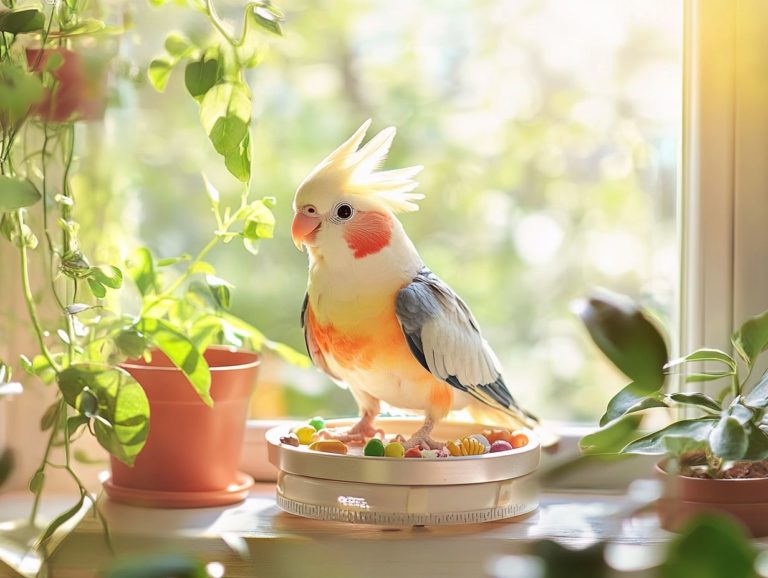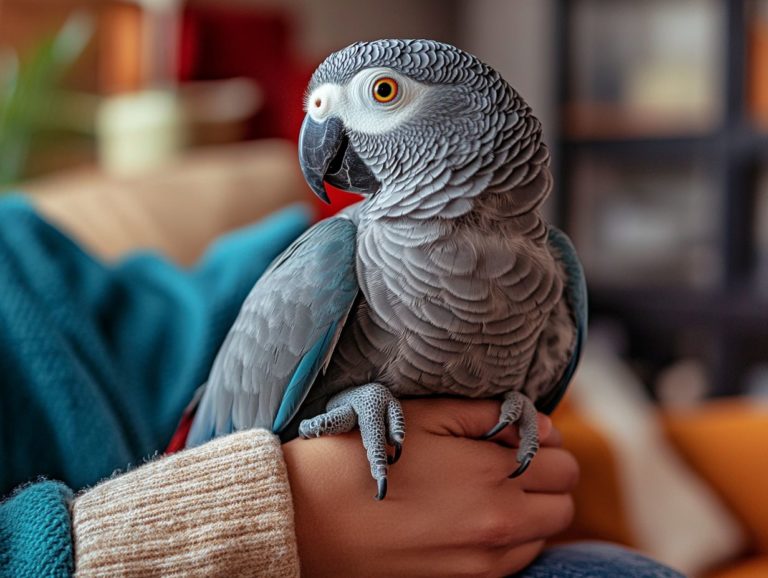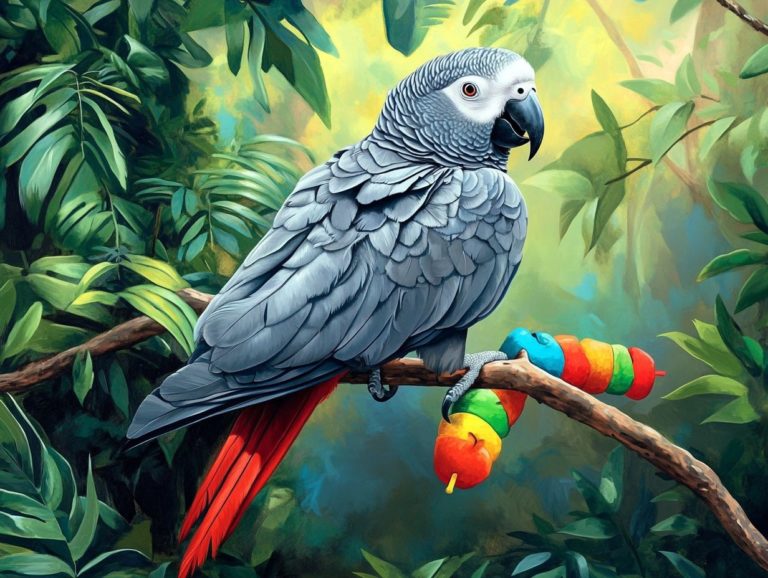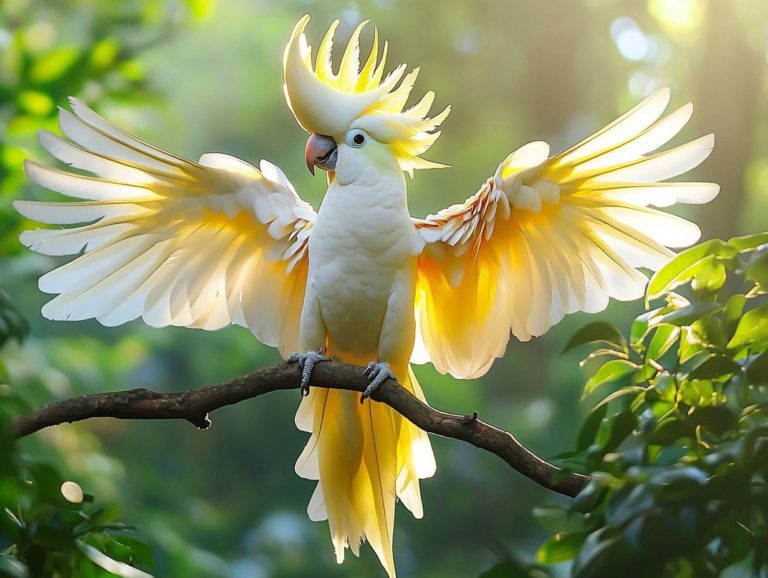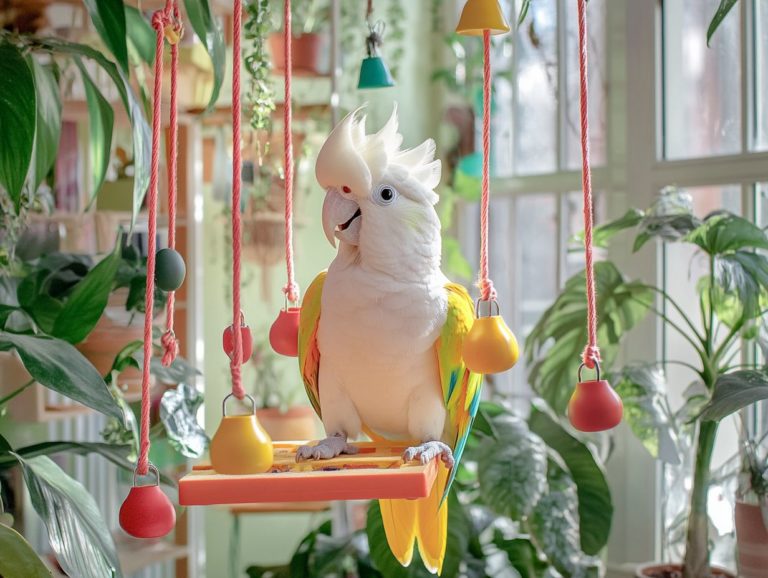Common Behavior Issues in Lovebirds
Lovebirds are cherished for their vibrant personalities and affectionate nature, but like any pet, they can encounter behavioral challenges.
Let s explore the common issues lovebirds face, such as aggression toward other birds, feather plucking, excessive vocalization, and separation anxiety.
We will examine the underlying causes ranging from things around them to health concerns and emphasize effective strategies for tackling these behaviors through positive reinforcement and veterinary guidance.
You’ll find tips to create a nurturing environment that not only addresses current challenges but also prevents future issues.
Contents
- Key Takeaways:
- Common Behavior Issues in Lovebirds
- Causes of Behavior Issues in Lovebirds
- Addressing and Managing Behavior Issues
- Preventing Behavior Issues in Lovebirds
- Frequently Asked Questions
- What are some common behavior issues in lovebirds like screaming, feather plucking, aggression, and biting?
- Wondering why lovebirds scream excessively? Lovebirds are social birds that use vocalizations to communicate with their flock. Excessive screaming can be a sign of boredom, attention-seeking, or separation anxiety.
- What causes feather plucking in lovebirds? Stress, boredom, and health issues such as mites or allergies can lead to feather plucking. It may also stem from a lack of mental stimulation and social interaction.
- How can I stop my lovebird from being aggressive? Aggression in lovebirds can signify fear, territorial behavior, or hormonal changes. Identify the root cause and use positive reinforcement techniques to train your lovebird to be less aggressive, while considering their emotional needs.
- What should I do if my lovebird bites me?
- How can I prevent common behavior issues in lovebirds?
Key Takeaways:
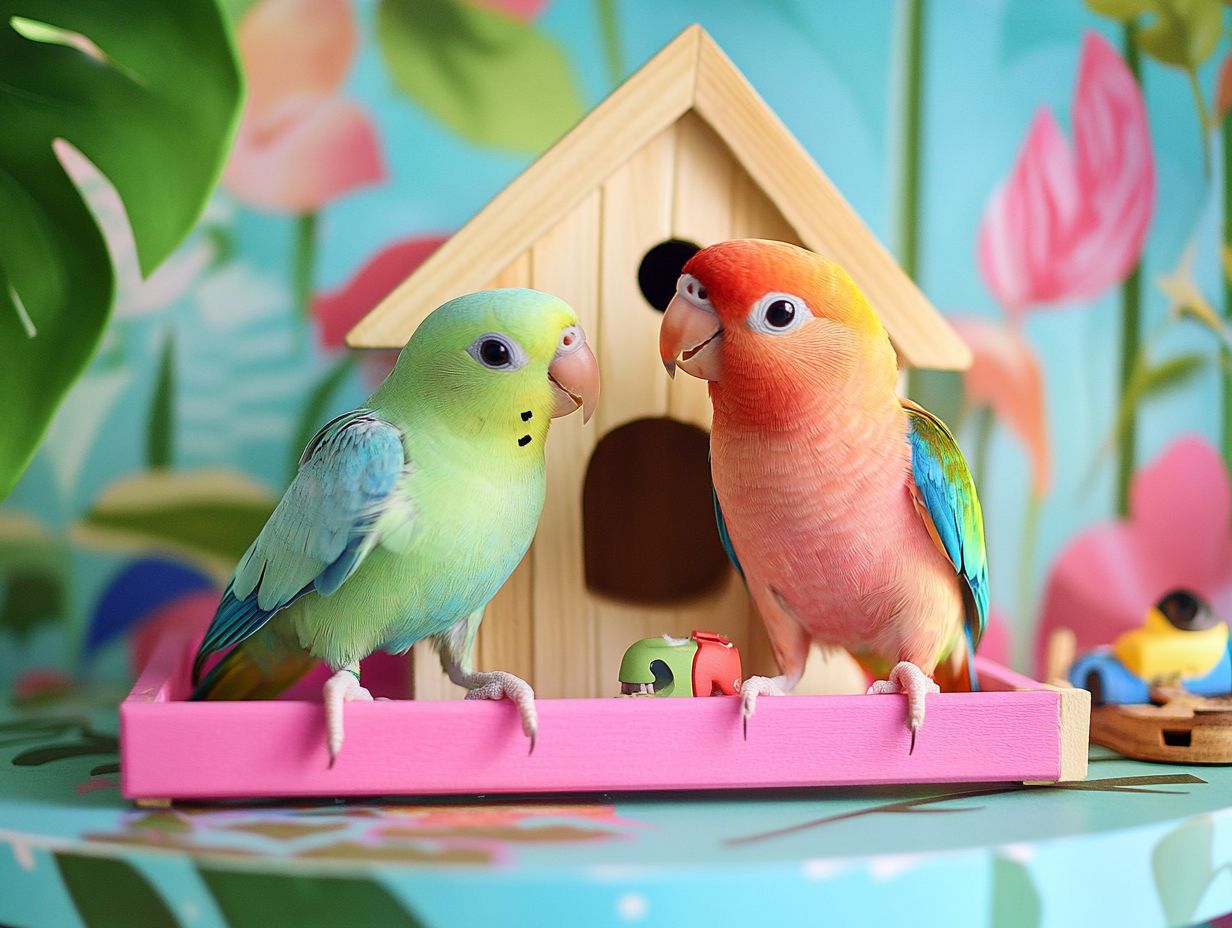
- Lovebirds are small parrots known for their monogamous relationships and affectionate behavior, thriving on companionship and interaction.
- Common behavior issues in lovebirds include aggression towards other birds, feather plucking, excessive vocalization, and separation anxiety.
- These problems can arise from environmental factors or health issues and can be managed through positive reinforcement techniques, training, and consultation with an avian veterinarian.
What are Lovebirds?
Lovebirds are delightful little parrots from the genus Agapornis, renowned for their affectionate nature and playful antics. These charming birds thrive on companionship and rely on ample interaction and emotional care from their owners to truly flourish.
With their vibrant feathers and captivating personalities, lovebirds have become beloved pets among bird enthusiasts. To keep lovebirds happy and healthy, knowing their unique needs and behaviors is key!
When kept in pairs, lovebirds exhibit a delightful array of social behaviors, such as preening one another and engaging in playful antics that reinforce their strong bonds. Each species within the Agapornis genus has its own unique traits; for instance, the peach-faced lovebird is celebrated for its sociable demeanor, while the masked lovebird often showcases a more playful spirit.
Understanding the emotional needs of each species is crucial for ensuring their wellness. The emotional wellness of these birds heavily relies on their social interactions without companionship, they can easily become stressed and develop behavioral problems, leading to issues such as aggression and anxiety.
Therefore, regular handling and mental stimulation are essential in their training. This not only ensures their happiness but also fosters a harmonious relationship between you and your feathered companion, keeping their emotional needs in check.
Common Behavior Issues in Lovebirds
Lovebirds, like any cherished pet, may encounter common behavioral issues that arise from emotional distress, environmental factors, or health concerns. You might notice these problems manifesting as aggression towards other birds, feather plucking, excessive vocalization, or even separation anxiety.
Grasping the nuances of these behaviors is essential for you as an owner, paving the way for effective solutions that enhance the well-being of your delightful companions. The crux of the matter lies in identifying the root causes and implementing tailored strategies to address them, fostering a harmonious environment for both your lovebirds and yourself.
If you notice any of these behavioral issues, consider applying these tips or consulting with your veterinarian for further assistance.
Aggression Towards Other Birds
Aggression towards other birds in lovebirds can be a troubling behavior that often surfaces due to insufficient socialization or environmental stressors. When lovebirds feel their social needs aren’t met, they may resort to biting or attacking as a defense mechanism. Understanding the triggers of this aggression is crucial for cultivating a peaceful coexistence among your pets and preventing destructive behaviors.
The roots of this aggression can vary, often stemming from factors like protecting their space, where your lovebird perceives the presence of others as a threat. Hormonal fluctuations during breeding seasons can also amplify aggressive tendencies. A lack of interaction and socialization opportunities might heighten insecurities, leading to conflicts.
To effectively manage this aggression, consider employing positive reinforcement training techniques (rewarding good behavior to encourage it). Rewarding desirable behavior can promote healthier interactions among your feathered friends. Make environmental adjustments, such as providing ample space and enriching their habitat with toys and safe perches, to significantly enhance their social experience, fostering a more harmonious living environment.
Feather Plucking
Feather plucking can distress your lovebird and is often tied to emotional issues like anxiety or boredom. This habit can lead to serious wellness concerns. You might find this behavior triggered by environmental stress, insufficient mental stimulation, or even medical conditions.
Spotting the signs of distress quickly can make a big difference! Implement effective solutions to help them overcome this troubling behavior, such as consulting an avian veterinarian, to promote healthier feather conditions.
Understanding the root causes is crucial; unresolved emotional distress can spiral into further health complications, including skin infections and behavioral disorders. To tackle feather plucking, consult with an avian veterinarian who can pinpoint any underlying health issues and recommend appropriate treatment.
Enhancing your lovebirds’ living environment is also a vital strategy. Providing a variety of toys, climbing structures, and opportunities for social interaction can significantly reduce stress and boredom. Incorporating mental challenges, like puzzle feeders or training exercises, will stimulate their intelligence and engage their curiosity, ultimately promoting a calmer disposition.
Excessive Vocalization
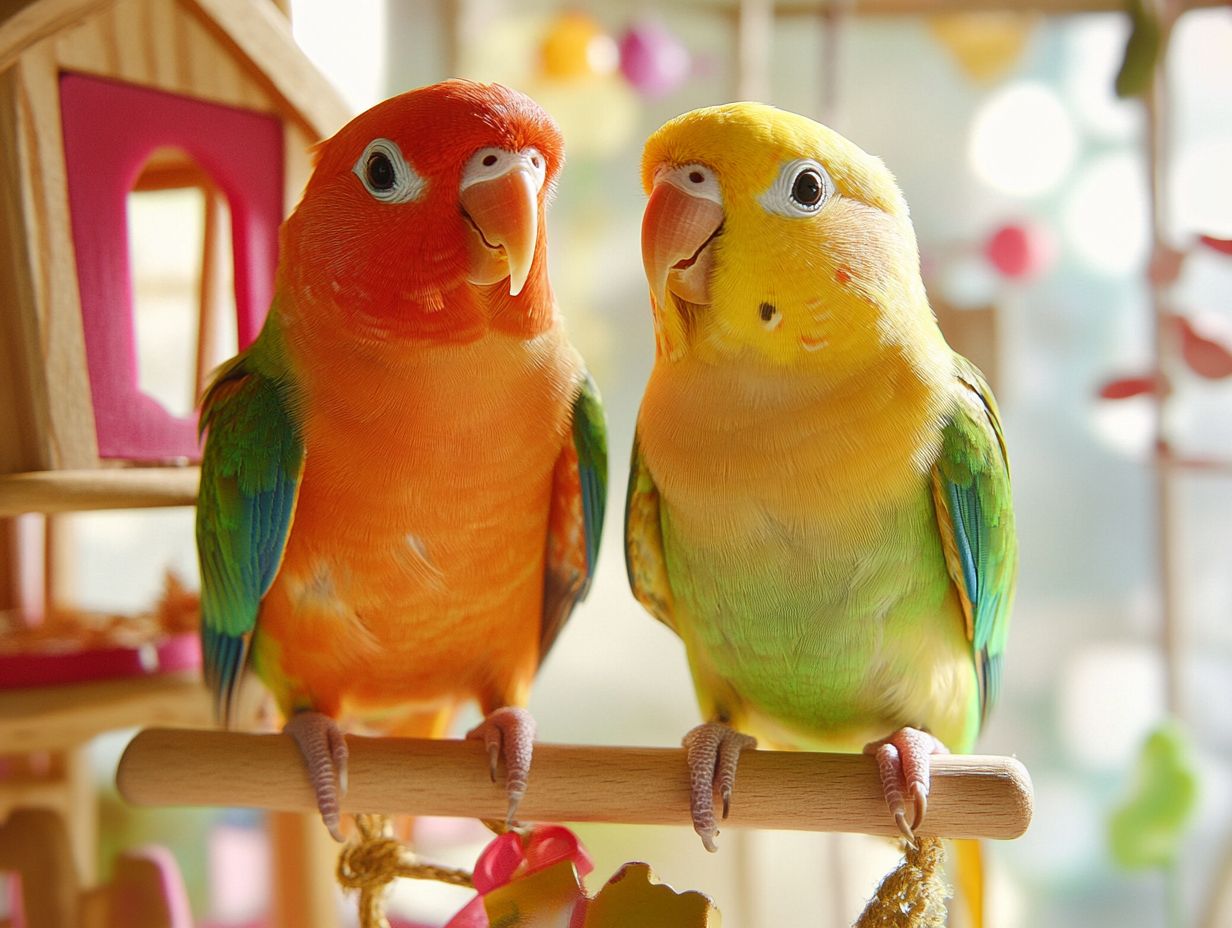
Excessive vocalization is a common issue among lovebirds, reflecting their desire for communication and social interaction. While a bit of chirping is perfectly normal, persistent screaming may signal underlying emotional distress or unmet needs, such as attention or socialization. Act quickly to address this behavior to ensure your lovebird stays happy and healthy!
Understanding the reasons behind such vocalization can help you manage it effectively. Often, anxiety triggers these outbursts, particularly in new or unfamiliar settings. Boredom is another significant factor; lovebirds are intelligent creatures that thrive on mental stimulation. Some may resort to attention-seeking behaviors, believing that loud noises will capture your focus.
To mitigate excessive noise, such as screaming, consider the following recommendations:
- Engage your bird with interactive toys that promote mental stimulation.
- Dedicate regular playtime to strengthen your bond.
- Create a routine that offers comfort and stability.
Training techniques, such as rewarding quiet behavior with treats, can also foster more desirable vocal habits, ensuring that your lovebird s emotional and social needs are met adequately and reducing anxiety.
Separation Anxiety
Separation anxiety in lovebirds can occur when they are left alone for long periods. This can cause emotional distress and lead to destructive behaviors.
These social creatures thrive on companionship and routine. When their needs aren t met, they might express their anxiety through loud screeching or feather plucking.
Recognizing these signs and taking steps to address separation anxiety is essential for their emotional well-being. Paying attention to behavioral shifts is vital, as they often indicate a deeper emotional need that s going unmet.
To help your affectionate birds navigate this challenge, establish predictable routines. Knowing when they ll receive attention helps reduce their uncertainty.
Provide a variety of toys and interactive activities to keep their minds engaged, easing feelings of loneliness. A second lovebird could be the perfect solution! It fosters the companionship they crave, creating a happier home.
Causes of Behavior Issues in Lovebirds
Understanding the causes of behavioral issues in lovebirds is crucial for effective management and rehabilitation. These causes can be classified into three main categories: environmental factors, health concerns, and emotional states.
By identifying these underlying issues, you can implement targeted solutions that enhance your lovebirds’ overall well-being. Consider using nutritional supplements and creating a nurturing environment that minimizes their distress.
Environmental Factors
Environmental factors significantly influence the behavior and well-being of lovebirds. It is essential to provide a stimulating and safe environment that caters to their needs.
Elements such as cage size, the presence of toys, and social interaction directly impact their mental stimulation and emotional health. By ensuring a properly enriched living space, you promote a happy and healthy lovebird.
A spacious cage offers your lovebirds the freedom to move, which is vital for their physical health. Regular interaction with you or other birds is crucial for socialization.
An assortment of toys not only keeps boredom at bay but also encourages natural behaviors like chewing and climbing. Incorporate perches at varying heights to keep their surroundings fresh.
Rotating their toys every few weeks can also add excitement. Ultimately, crafting an engaging atmosphere enhances their happiness and minimizes unwanted behaviors.
Health Issues
Health issues can profoundly affect the behavior of lovebirds, often resulting in emotional distress and behavioral challenges. For instance, concerns such as a disease that affects feathers and beaks or nutritional deficiencies can lead to observable changes in behavior. To better understand these changes, it’s helpful to explore lovebird communication.
Regular consultations with an avian veterinarian are essential for ensuring the health and wellness of your lovebirds. This enables you to address emerging issues promptly and mitigate potential problems related to their emotional and physical distress.
Beyond feather and beak disease, your lovebirds might encounter issues like feather plucking, respiratory infections, and parasitic infestations. These can alter their typical social interactions.
For instance, respiratory ailments may manifest as coughing or sneezing, diminishing their playfulness and increasing lethargy. It’s crucial to observe even the most subtle signs of distress, as these often signal an underlying health concern.
By providing a balanced diet and scheduling routine check-ups, you can prevent many of these ailments. Maintaining open communication with a veterinarian helps in early diagnosis.
This also fosters an enriching environment for your vibrant companions, ensuring their socialization needs are met. What steps will you take to ensure your lovebirds are happy and healthy?
Addressing and Managing Behavior Issues
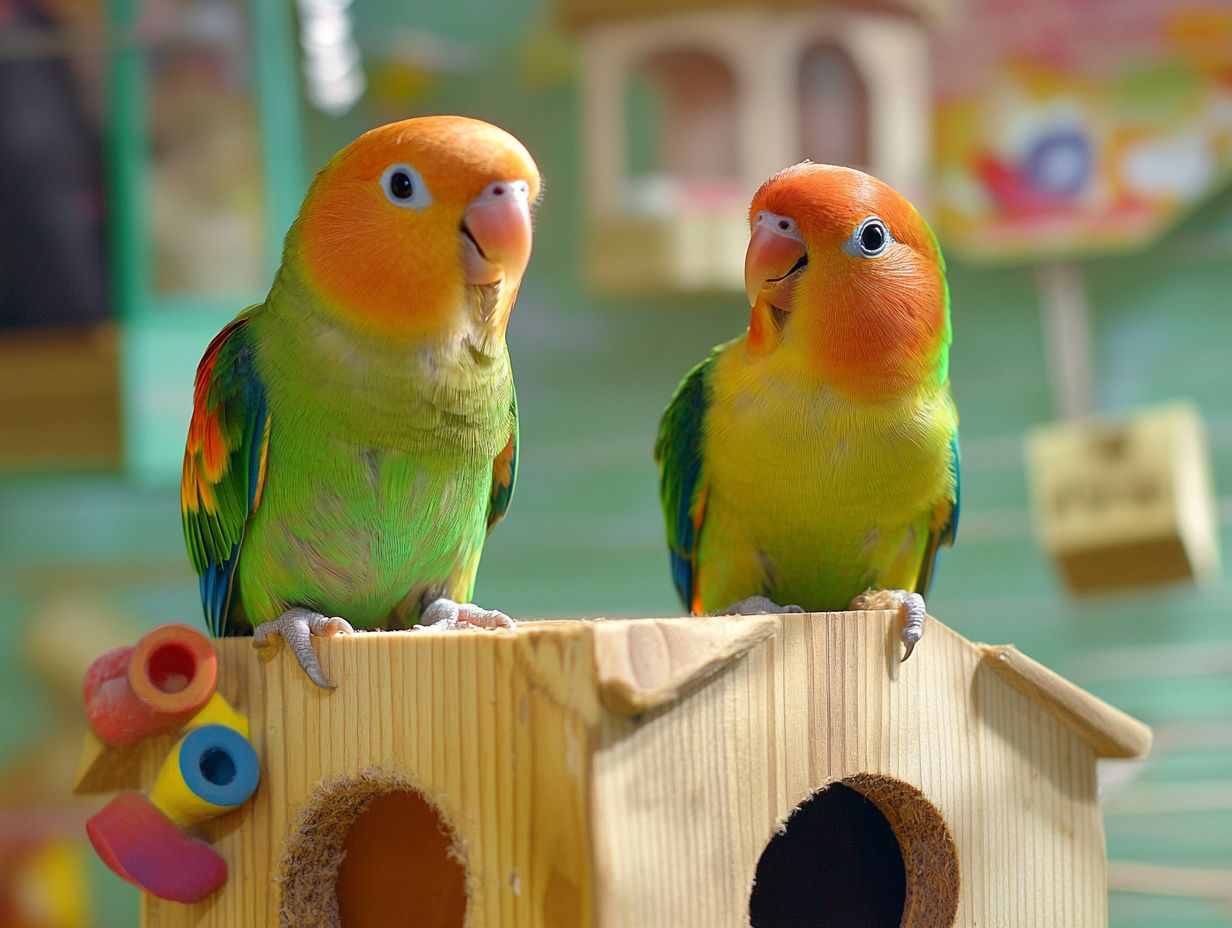
Addressing behavior issues in lovebirds requires understanding their unique behaviors. Use effective solutions to encourage desired behaviors while reducing undesired ones.
Consider their emotional and physical needs. This foundation helps create a nurturing environment that promotes well-being and reduces destructive behaviors.
Positive Reinforcement Techniques
Use positive reinforcement techniques to train your lovebirds. These methods build trust and encourage good behavior.
Reward good behavior with treats or kind words. This encourages your lovebirds to repeat those actions and reduces negative behaviors.
Try target training. Your lovebird learns to touch a stick or your finger and gets a treat for doing it successfully.
Consistency is key. Regular, short training sessions keep your bird engaged without overwhelming them.
Clicker training is another effective method. Use a click sound to mark desired behaviors, followed by a reward.
This clear communication helps your lovebirds understand what actions are praised. Thoughtfully using these techniques nurtures their natural instincts.
Consulting with a Veterinarian
Consult an avian veterinarian about behavior problems. Health issues often cause these concerns.
Regular check-ups help identify and treat health problems early. This leads to better management of behavioral issues stemming from emotional or physical distress.
Avian veterinarians provide tailored care plans for your lovebirds. They offer insights into dietary needs, environmental enrichment, and socialization techniques.
This expertise is crucial. Even minor health problems can affect their mood and behavior, possibly leading to destructive actions.
A proactive approach with veterinarians ensures your lovebirds thrive physically and emotionally. It also helps address potential aggression or biting.
This dedicated attention strengthens your bond with your pet and nurtures a harmonious relationship.
Preventing Behavior Issues in Lovebirds
To prevent behavior issues, take proactive steps that prioritize their emotional and mental well-being.
Create a stimulating environment. Ensure ample socialization and maintain a consistent routine to lower the risk of aggression and biting.
Creating a Stimulating Environment
Creating a stimulating environment for your lovebirds is essential to meet their social and emotional needs. This ultimately promotes positive behavior and overall well-being. You can achieve this by providing a variety of toys, perches, and opportunities for exploration and interaction, which keep them mentally engaged.
A well-structured environment not only reduces anxiety but also fosters a happier, healthier lovebird, ensuring they feel safe and secure in their surroundings.
Make their living space exciting! Add safe toys made from non-toxic materials that let them explore. Installing climbing structures will give your lovebirds the opportunity to exercise and play, closely mirroring their natural habitat. It s also crucial to designate areas for social interaction, whether through shared playtime or a cozy nook for bonding, enhancing their overall companionship with you.
By offering a diverse range of activities and ensuring their enclosure is filled with safe, stimulating elements, you can guarantee these vibrant creatures thrive, leading to a happier and more harmonious companionship. This is particularly important when considering their need for mental stimulation.
Proper Diet and Nutrition
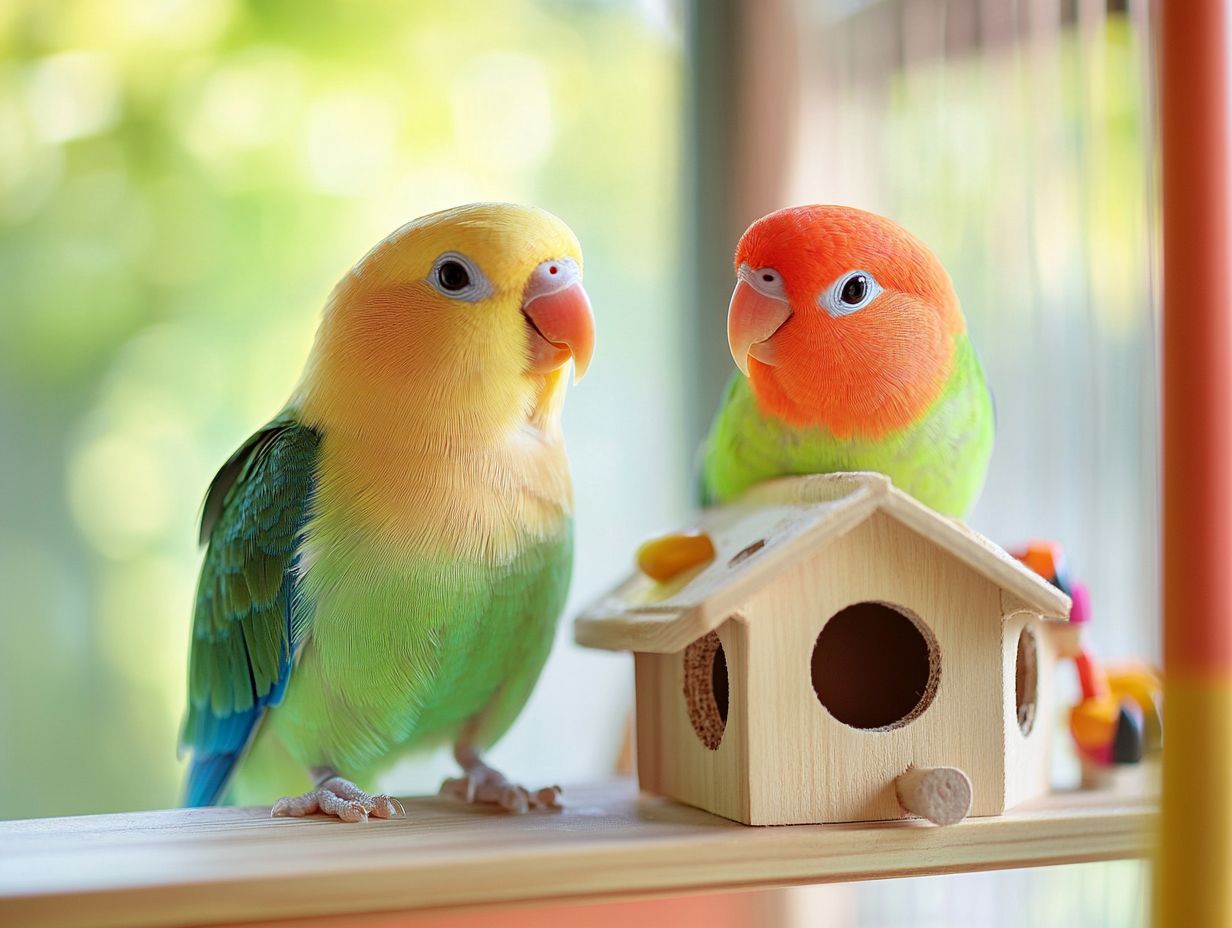
Providing the right diet and nutrition is essential for the health and wellness of lovebirds, significantly influencing their behavior and emotional state. A balanced avian diet, rich in fruits, vegetables, and high-quality pellets, ensures that your lovebirds receive the necessary nutrients to truly thrive.
Proper nutrition not only supports their physical health but also plays a vital role in maintaining emotional stability. This minimizes the risk of behavioral issues, including plucking and aggression.
Incorporating a diverse array of foods, including leafy greens like kale and spinach, along with occasional treats such as seeds and nuts, can engage their curious nature and promote mental stimulation. This variety prevents boredom and fosters a sense of security, an essential aspect of their emotional well-being.
Include nutritional supplements when necessary to support their overall health. Understanding the importance of vitamins and minerals like vitamin A found in vibrant orange vegetables or calcium for stronger bones highlights how targeted nutrition can elevate their overall mood and activity levels.
By adopting a tailored approach to their diet, lovebird owners can nurture happier, more sociable pets. This effectively reduces the likelihood of stress-induced behaviors like feather plucking or excessive vocalization, thus addressing potential anxiety.
Frequently Asked Questions
What are some common behavior issues in lovebirds like screaming, feather plucking, aggression, and biting?
Some common behavior issues in lovebirds include excessive screaming, feather plucking, aggression, and biting. To learn more about addressing these concerns, check out how to handle behavioral issues in adopted birds.
Lovebirds are social birds that use vocalizations to communicate with their flock. Excessive screaming can indicate boredom, attention-seeking, or separation anxiety.
Feather plucking can be caused by stress, boredom, and health issues such as mites or allergies. It can also result from a lack of mental and physical stimulation.
How can I stop my lovebird from being aggressive? Aggression in lovebirds can signify fear, territorial behavior, or hormonal changes. Identify the root cause and use positive reinforcement techniques to train your lovebird to be less aggressive, while considering their emotional needs.
Aggression in lovebirds can signal fear, territorial behavior, or hormonal changes. It’s important to identify the root cause and use positive reinforcement techniques to train your lovebird to be less aggressive.
What should I do if my lovebird bites me?
Lovebirds may bite out of fear, stress, or to establish dominance. If your lovebird bites you, stay calm and avoid reacting negatively.
Instead, redirect their behavior and reward them with positive reinforcement when they behave well.
How can I prevent common behavior issues in lovebirds?
Give your lovebirds the exciting environment they deserve! Provide regular interaction, fun toys, and a balanced diet.
Consult a bird behavior expert if you see any issues arise.


